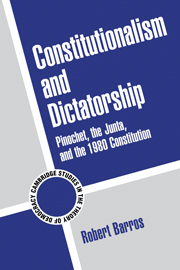Book contents
- Frontmatter
- Contents
- Foreword
- Acknowledgments
- Abbreviations
- Introduction
- 1 Dictatorship, Legality, and Institutional Constraints
- 2 The Constitution of the Exception: Defining the Rules of Military Rule
- 3 The Constitution and the Dictatorship: The Supreme Court and the Constitutionality of Decree-Laws
- 4 The Shadowy Boundary between Force and Law: The Judiciary, Repression, and the Cosmetic Limitation of Emergency Powers
- 5 Constitutionalization without Transition: Prompting the Dual Constitution of 1980
- 6 The Permanent Text: Constitutional Controls or Military Tutelage?
- 7 Even Custom Shoes Bind: Military Rule under the Constitution, 1981–1988
- 8 Military Dictatorship and Constitutionalism in Chile
- References
- Index
2 - The Constitution of the Exception: Defining the Rules of Military Rule
Published online by Cambridge University Press: 10 December 2009
- Frontmatter
- Contents
- Foreword
- Acknowledgments
- Abbreviations
- Introduction
- 1 Dictatorship, Legality, and Institutional Constraints
- 2 The Constitution of the Exception: Defining the Rules of Military Rule
- 3 The Constitution and the Dictatorship: The Supreme Court and the Constitutionality of Decree-Laws
- 4 The Shadowy Boundary between Force and Law: The Judiciary, Repression, and the Cosmetic Limitation of Emergency Powers
- 5 Constitutionalization without Transition: Prompting the Dual Constitution of 1980
- 6 The Permanent Text: Constitutional Controls or Military Tutelage?
- 7 Even Custom Shoes Bind: Military Rule under the Constitution, 1981–1988
- 8 Military Dictatorship and Constitutionalism in Chile
- References
- Index
Summary
When on September 11, 1973, the Chilean armed forces and carabineros, the national police, ousted the properly elected government of Salvador Allende, seized power, and unleashed a violent repression against the Left, they unambiguously broke with standing constitutional norms regarding the obedient and nondeliberative character of the armed forces, valid methods of accession to and abdication of office, the separation of powers, and the rule of law. By these acts the Chilean armed forces put an end to democracy and opened the door to dictatorship. Though the exclusionary and repressive character of the military's rule was blatant from the outset, what type of dictatorship would follow was not immediately evident. Within a day of the coup, the armed forces arrogated to themselves the “Supreme Command of the Nation,” formed a four-man Junta de Gobierno composed of the commanders in chief of the army, navy, and air force and the director general of the national police force, carabineros, and pledged to respect the law and the constitution insofar as the situation permitted.
However, these initial measures were ambiguous and raised a number of questions. First, what would be the scope of the new regime's powers? The concept Supreme Command of the Nation was without referent within the Chilean constitutional tradition and provided few clues as to the range of powers assumed by the military. Second, once the scope of these powers was settled, how would their exercise be organized among the armed forces? Would one force dominate the executive or would mechanisms for power sharing be instituted?
- Type
- Chapter
- Information
- Constitutionalism and DictatorshipPinochet, the Junta, and the 1980 Constitution, pp. 36 - 83Publisher: Cambridge University PressPrint publication year: 2002

